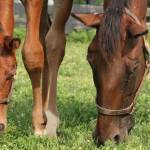Foal Nutrition: Four Creep-Feeding Tips

A “one-size-fits-all” approach to creep feeding does not exist, so every foal must be treated and fed as an individual. Here are a few tips to consider.
All foals ultimately need to be weaned, but not all foals require creep feeding.
“Some foals grow at an appropriate rate based on their breed just by consuming the mare’s milk and her forage and concentrates,” explained Kathleen Crandell, Ph.D., a Kentucky Equine Research nutritionist.
The major reasons for creep feeding include offering extra calories to foals not growing at the expected rate and to balance the diet for vitamins and minerals. Without balanced micronutrients, foals are at risk of developing developmental orthopedic diseases, such as osteochondrosis and osteochondritis dissecans (OCD).
If you are going to creep feed, start around 90 days of age.
“The quality of mare’s milk starts to decline at about 90 days. If a foal is not growing well or shows an abnormally low body condition, this could be a sign that the mare is not producing enough milk,” Crandell explained.
Be aware that some foals may require creep feeding before 90 days. In such cases, a special milk-based creep feed is more appropriate than a more traditional creep feed designed for older foals.
Crandell added, “Before 90 days of age, a foal’s immature digestive tract is still well disposed to digesting milk, which is why when creep feeding a foal under 90 days of age it is a good idea to offer a milk-based product.”
Don’t go overboard with creep feeding.
As a general rule of thumb, foals are offered approximately 1 lb (0.45 kg) of supplemental feed per month of age of a concentrate formulated specifically for growing foals.
“This recommendation holds true for Thoroughbred foals, but this feeding rate may be too high for other breeds, like Arabians and many Warmbloods,” warned Crandell. “Easy-keeper types do better with a ration balancer as a creep feed so they don’t receive too many supplemental calories.”
Creep feeding helps the weaning process.
Weaning is often considered one of the most stressful times in a horse’s life. Anything an owner can do to alleviate worry or anxiety during separation should be embraced, including creep feeding. Experts suggest that if a foal is accustomed to concentrates in its diet prior to weaning then it should be able to transition through the weaning process more smoothly, at least from a nutritional standpoint.
“For assistance selecting creep feeds and first feeds to offer weanlings, consult a Kentucky Equine Research nutrition advisor. We can help minimize the usual hurdles encountered during creep feeding and weaning,” Crandell advised.








